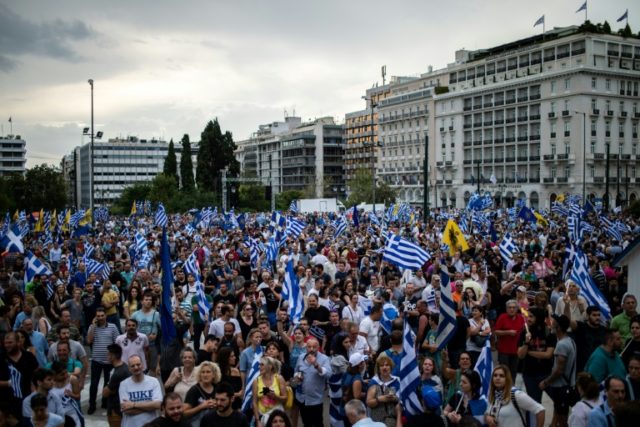Psarades (Greece) (AFP) – The small fishing village of Psarades is about to make history Sunday when the leaders of Greece and Macedonia meet to bury a 27-year-old name row, but many locals are seething.
“I would not call it a pleasant day,” says Achileas Papadopoulos, a 60-year-old fisherman on the banks of Lake Prespa, a natural boundary between the two countries.
“We are giving away the name ‘Macedonia’, and we’re supposed to be happy?” he says.
Greece and Macedonia later today will sign a preliminary accord to rename the small Balkan state the Republic of North Macedonia, ending a dispute dating to 1991.
Security is intense, with police cordons in place many miles (kilometres) from the village. Anybody seeking to approach has to pass through successive identity checks.
Protests against the agreement are expected in the area on Sunday.
On Saturday, as the government defeated a censure motion against the accord in Athens, clashes broke out between protesters and police outside parliament.
Officials later blamed the incident on far-right supporters of Greek neo-Nazi party Golden Dawn, some of whom attacked the cars of lawmakers after the vote.
– Bloody history –
Opposition is even stronger in Greece’s north, where Greek and Bulgarian guerrillas fought a bitter four-year war in the early 20th century for predominance among Orthodox Christians in then Ottoman-held Macedonia.
Two short wars were then fought in 1912 and 1913 between the Balkan states and the Ottoman Empire to end six centuries of rule from Istanbul, with atrocities committed by both sides.
“This land has been watered with blood,” says a 22-year-old Psarades local, who declined to give her name.
“Our grandfathers talk about the past and cry,” says this Greek woman.
The deal, brokered after months of intensive talks, is touted as a vital step for stability and economic development in the Balkans.
“Signing the deal will mean opening the border soon I guess. It means a lot, for us it is a huge thing,” says Bosko Dimovski, a 60-year-old from Dolno Dupeni, the first village on the Macedonian side of the border.
“This used to be one of the richest regions in the Balkans, and after the border was closed it became one of the poorest. Imagine what (the deal) will mean, just for the flow of people… local business, revival of tourism,” says Dimovski, who runs a beach bar just 50 metres from the border.
Greek Foreign Minister Nikos Kotzias and Nikola Dimitrov of Macedonia will sign the historic accord, with Prime Ministers Alexis Tsipras and Zoran Zaev in attendance, joined by officials from the United Nations and the European Union, who have welcomed the move.
Once ratified by the countries’ respective parliaments and confirmed by a referendum in Macedonia by the end of the year, the agreement will also enable the landlocked state to eventually join the European Union and NATO.
strs/jph/bmm

COMMENTS
Please let us know if you're having issues with commenting.